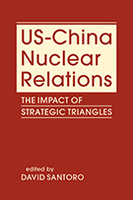US-China Nuclear Relations: The Impact of Strategic Triangles
David Santoro, editor | | ISBN: 978-1-62637-907-7 $95.00 |
| ISBN: 978-1-62637-952-7 $95.00 |
| 2021/262 pages/LC: 2021015771 |
DESCRIPTION
Though China remains a relatively weak nuclear power, it has in recent years become central to US strategic policymaking. What explains this shift? How is the US-China strategic nuclear relationship evolving? What role do other states play in shaping it?
To address these questions, the authors of US-China Nuclear Relations examine a series of strategic triangles involving China, the US, and one or more key third actors (among them, Australia, India, Iran, Japan, North Korea, Pakistan, Russia, South Korea, and Taiwan). Their work also critically highlights the challenges and opportunities facing Washington and Beijing in this increasingly complex security arena.
ABOUT THE AUTHOR
David Santoro is vice president and director for nuclear policy programs at the Honolulu-based Pacific Forum.
CONTENTS
- The Importance of Strategic Triangles—D. Santoro.
- The US-China Strategic Nuclear Relationship—D. Santoro.
- The Major Power Game: The United States, China, and Russia—J. K. Warden.
- Proliferation Pariahs in the Mix: North Korea and Iran—R. Einhorn.
- Complex Relationships: The United States, China, and US Regional Allies—B. Glosserman.
- Competitive Deterrence? The United States, China, and South Asia—T. Dalton.
- Third Actors and US-China Nuclear Strategies—D. Santoro.


"Thinkers and doers involved with the complexities of deterrence and assurance in Asia will greatly benefit from this … lucid elaboration of both chronic and emerging entanglements of interests, perceptions, and weapons in the region."—Elaine Bunn, former US Deputy Assistant Secretary of Defense for Nuclear and Missile Defense Policy
"Outstanding…. This volume will be immensely valuable to both scholars and policymakers who seek to understand the increasingly complex Asian and global strategic nuclear landscape." —Bonnie Glaser, Center for Strategic and International Studies
"Followers of nuclear weapons issues will benefit from … this sobering explanation of why and how the existing security order is so 'ripe for change.' In a fusion of analytic rigor and policy pragmatism, [the authors] recommend how to manage what amounts to a complex, multidimensional game of nuclear chess." —Robert Gromoll, former Acting Deputy Assistant Secretary for Nuclear Affairs, US Department of State
"The unique value of this new volume is to put the US-China strategic relationship in its multipolar context. By examining a series of 'strategic triangles,' it offers fresh insights useful to both academics and policymakers." —Brad Roberts, Center for Global Security Research, Lawrence Livermore National Laboratory